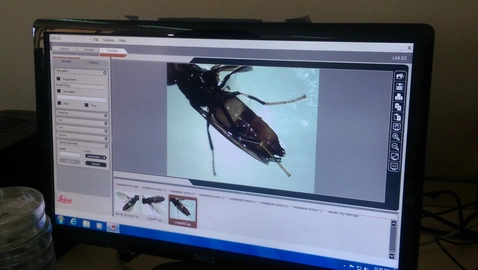International research team shows potential of larvae to substitute other animal- or plant-derived protein sources in commercial livestock feed.
Bonn, July 12, 2019. In Africa, livestock production currently accounts for about 30% of the gross value of agricultural production. However, production is struggling to keep up with the demands of expanding human populations, the rise in urbanization and the associated shifts in diet habits. High costs of feed prevent the livestock sector from thriving and meeting the rising consumer demand. In recent years, researchers identified insects as potential alternatives to the conventionally used protein sources in livestock feed. They assessed that insects have rich nutrients content and can be reared on organic side streams. Moreover, substrates derived from organic by-products are suitable for industrial large-scale production of insect meal.
Methodological approach
A holistic comparison was conducted of the nutritive value of Black Soldier Fly larvae reared on three different organic substrates, i.e. chicken manure, brewers’ spent grain and kitchen waste. All sources of the tested substrates were local. The substrates were chosen on the basis of their availability in Nairobi, with a view of their potential future use for large-scale industrial production of Black Soldier Fly larvae in Kenya and beyond in Africa. Samples of Black Soldier Fly larvae that were reared on each substrate were collected for chemical analysis after the feeding process. Samples of the Black Soldier Fly larvae and substrates were analyzed for dry matter, crude protein, ether extracts, ash, acid detergent fibre, neutral detergent fibre, amino acids, fatty acids, vitamins, flavonoids, minerals and aflatoxins.
Small insects can have a huge impact in Africa
The laboratory experiments showed that commonly available organic waste streams in urban environments of the developing world can be successfully used to produce high quality Black Soldier Fly larvae. The larvae have the potential to substitute other animal- or plant-derived protein sources in commercial livestock feed. Wide-scale application of this approach would reduce the ecological and economic footprint of feed to an enormous extent, thereby contributing to more sustainable animal husbandry systems. Moreover, it can provide valuable ecosystem services through the bioconversion of municipal and organic waste streams into bio-compost. To achieve this, appropriate and cost-effective mass-rearing technologies for the Black Soldier Fly should be developed. Kenya and Uganda recently approved dried insect products for use in all animal and fish feed. Following their footsteps, a regional African insect feed policy that ensures safe production within adequate hygiene standards should be introduced.
Read the full article here: <link https: www.nature.com articles s41598-019-46603-z>www.nature.com/articles/s41598-019-46603-z “The nutritive value of black soldier fly larvae reared on common organic waste streams in Kenya” (SREP-18-45105).
Background information on authors:
First author is Marwa Shumo, doctoral researcher at the <link https: www.zef.de>Center for Development Research (ZEF) at Bonn University, Germany. The publication is part of her doctorate research/dissertation supervised by ZEF- director Prof Christian Borgemeister, Dr Isaac M. Osuga of Jomo Kenyatta University of Agriculture and Technology, Nairobi (JKUAT) and Dr Sunday Ekesi ,Director of Research and Partnerships at the international centre of insect physiology and ecology (icipe). The field work was conducted in Nairobi and the experiments at the Laboratory of Prof Baldwin Torto in icipe’s Behavioral and Chemical Ecology Unit. The research was funded by ENTONUTRI project via the German Ministry for Economic Cooperation and Development (BMZ) through the Deutsche Gesellschaft für Internationale Zusammenarbeit (GIZ) and INSFEED project funded by the Canadian International Development Research Centre (IDRC) and the Australian Centre for International Agricultural Research (ACIAR).
Photos: Please contact <link>presse.zef@uni-bonn.de
Read more about Marwa Shumo's research in her blog posts:


